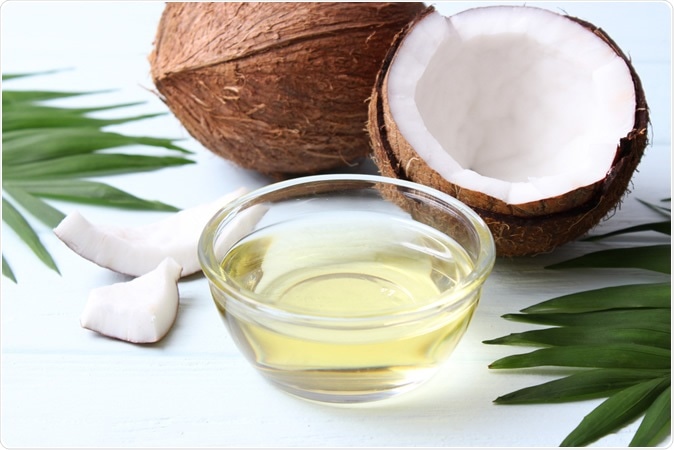Elevated low-density lipoprotein (LDL) or bad cholesterol level is an established risk factor for developing cardiovascular disease (CVD), including heart disease, hypertension, and stroke. Contrary to current claims that coconut oil can benefit cardiovascular health, a new study combining 16 published research shows that consumption of coconut oil is linked to higher levels of LDL and total cholesterol levels.
The study, published in the journal Circulation, sheds light on the effects of coconut oil on a person’s lipid profile. Coconut oil is high in saturated fat, which may elevate the serum cholesterol concentrations, despite various studies of its health benefits. To find out the effect of coconut oil on cholesterol levels, the researchers performed a systematic review of coconut oil consumption impact on blood lipids and other cardiovascular risk factors.

Coconuts and coconut oil. White bear studio / Shutterstock
What did the study find?
To arrive at the study findings, the researchers looked for published studies on PubMed, Cochrane Registry, SCOPUS, and Web of Science through June 2019. They chose trials comparing the effects of coconut oil with other types of oils that lasted for about two weeks. They screened the articles and collected data, using the PRISMA (Preferred Reporting Items for Systematic Reviews and Meta-Analyses) guidelines.
The studies they reviewed had main outcomes that included high-density lipoprotein (HDL), low-density lipoprotein (LCL), triglycerides, total cholesterol, body fat, glycemia, and markers of inflammation.
In the 16 articles they studied, they found that coconut consumption markedly increased LDL-cholesterol by 10.47 mg/dL. They found that compared to non-tropical olive oil, canola oil, and soybean oil, high consumption of coconut oil substantially elevated LDL cholesterol. In fact, taking about 3 to 4 tablespoons of coconut oil per day was tied to an approximately 10 mg/dL increase, or about a 9-percent increase in LDL serum levels.
“Coconut oil consumption results in significantly higher LDL-cholesterol than nontropical vegetable oils. This should inform choices about coconut oil consumption,” the researchers concluded in the study.
“The hypercholesterolemic effect of coconut oil intake is probably attributable to its high saturated fat content. Our results on adverse effects of coconut oil as compared with alternative cooking oils on LDL cholesterol concentrations thus align with dietary recommendations to replace saturated fat with polyunsaturated fat,” the researchers added.
Coconut oil consists of about 90 percent saturated fat, which is higher than the proportion of saturated fat found in lard or butter. The researchers said that consuming coconut oil ups cardiovascular risk by increasing LDL levels and has no benefits in terms of body fatness, blood sugar levels, inflammation, or cardiovascular health, contrary to popular claims.
Increased LDL and its impact on the body
Low-density lipoprotein (LDL) or bad cholesterol is an unhealthy type of cholesterol that can build up in the arteries, limiting the blood flow to the various cells in the body. The deposits, called plaques, can accumulate over time and clog the arteries, making it harder for blood to pass through. It leads to a condition called atherosclerosis, which is a major risk factor for cardiovascular disease, and potentially fatal conditions such as heart attack, stroke, and hypertension.
LDL is the main carrier of cholesterol in the bloodstream and it enters into the walls of major arteries. They deposit cholesterol on the arterial walls, setting off a chronic inflammatory reaction that aids in plaque build-up in the arteries.
The American Heart Association (AHA) recommends that for those who are at a high risk of cardiovascular disease to lower the LDL level to 70 mg/dL, but the normal range is below 100 mg/dL, whole total cholesterol level should be about 150 mg/dL.
Journal reference:
The Effect of Coconut Oil Consumption on Cardiovascular Risk Factors: A Systematic Review and Meta-Analysis of Clinical Trials Nithya Neelakantan , Jowy Yi Hoong Seah , and Rob M. van Dam, https://www.health.harvard.edu/blog/ldl-cholesterol-how-low-can-you-safely-go-2020012018638